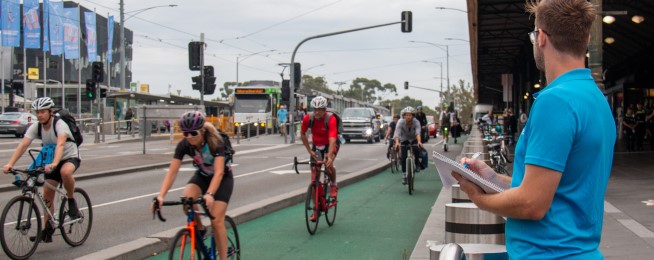Bicycle Network's Super Tuesday commuter count took place this morning and early data depicts a slow state of recovery for Melbourne's struggling CBD.
Preliminary data from the annual count confirms that many city workers have become comfortable in the home office, with bike riding numbers across the five most popular routes into the city all down from Super Tuesday 2021.
Strava data on trips by bike across Melbourne corroborates a general decline from 2021 so far this year, as the lingering Omicron variant seems to be having a noticeable impact on the city's recovery.
But it's not all bad news for bike riders. Moreland City Council's pop-up bike lane upgrade on Albion Street in Brunswick is attracting more riders to the area, with a 149% increase in riders from last year's count at the intersection of Albion and Barrow Street.
Similarly, bike traffic at the count sites along Peel Street, Melbourne and Dawson Street, Brunswick – where new bike lane upgrades have been added – increased by 14% and 11% from the 2021 count, respectively.
Data from the remaining count sites will continue to be processed over the coming months, with hopes to find similar trends around new pieces of bike-friendly infrastructure.
Over 680 volunteer counters across 36 council areas hit the streets between 7am and 9am this morning to count the amount of bike riders, the directions travelled and the gender of each rider (based off a visual gender assumption).
This data will help provide insight for local governments into how commuting habits are evolving and will be a valuable tool for councils to evaluate and adjust to the new status quo.
Counts took place around Melbourne, Adelaide, Hobart and Perth, with counting in Sydney postponed for one week due to heavy rain.
Foreboding weather forecasts in Melbourne and Hobart is also suspected to have impacted rider numbers, and follow-up counts are planned in the coming months to confirm.
Importantly, Super Tuesday also pumped over $40,000 back into the community, with each counter receiving a $60 donation to a club or organisation of their choice, or 6 months Bicycle Network membership.
Bicycle Network CEO Craig Richards said that this year's Super Tuesday numbers will paint an interesting picture for Melbourne's recovery timeline.
"We know that recreational riding boomed as Melburnians' love affair with bikes helped us all through some of the world's longest lockdowns, but these figures have unfortunately not yet translated into people jumping on their bike to head back to the office", said Mr Richards.
"Local and state governments have been working hard to create more attractive places for people to ride, but it will clearly take some time for bike traffic in those office commuting hours to bounce back to pre-pandemic levels."
The complete data from Super Tuesday 2022 will continue to be tallied over the coming weeks and eventually published on our data dashboard, where over 10 years of data is stored.
Become our friend
Find out more about Bicycle Network and support us in making it easier for people to ride bikes.


